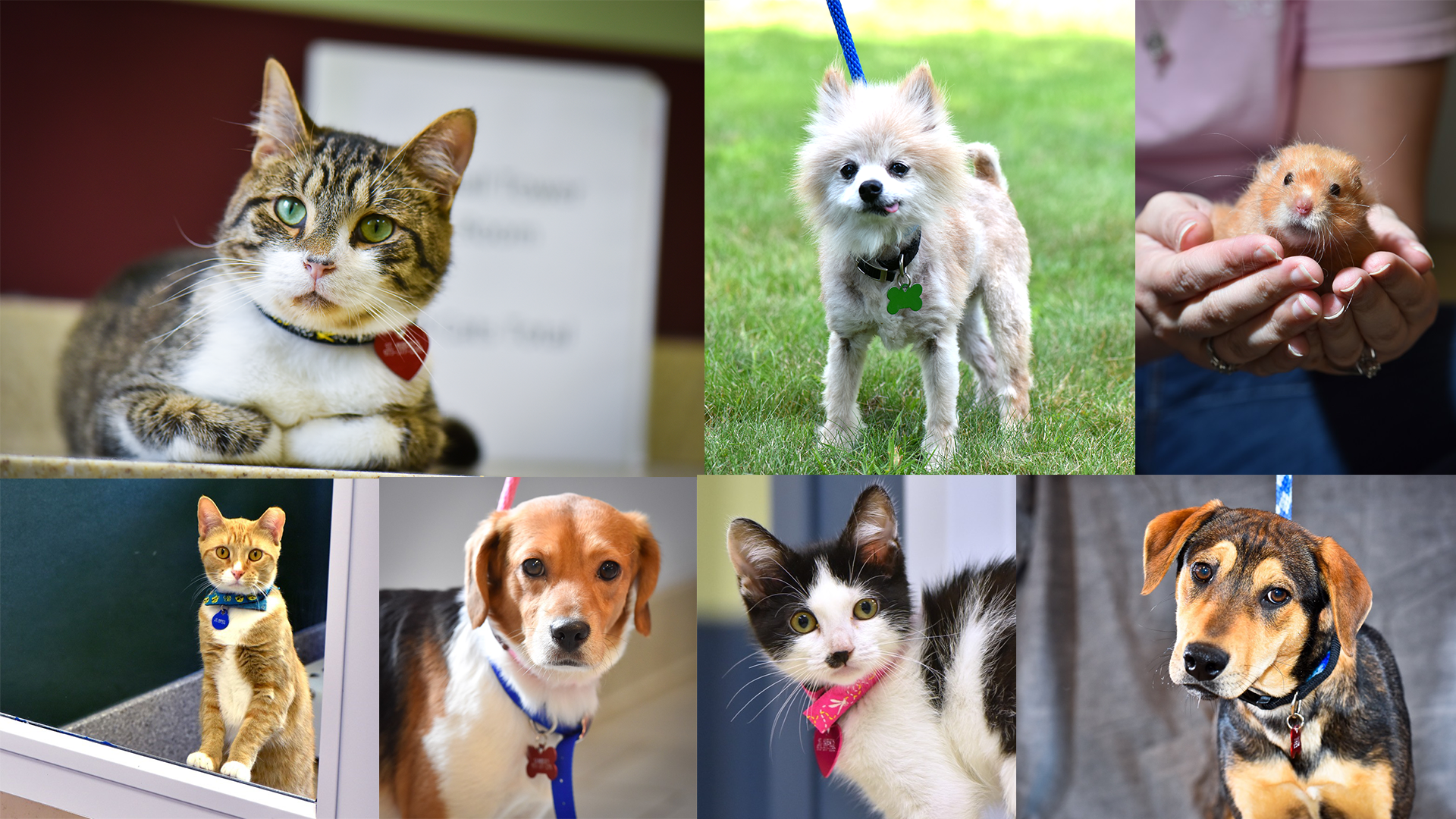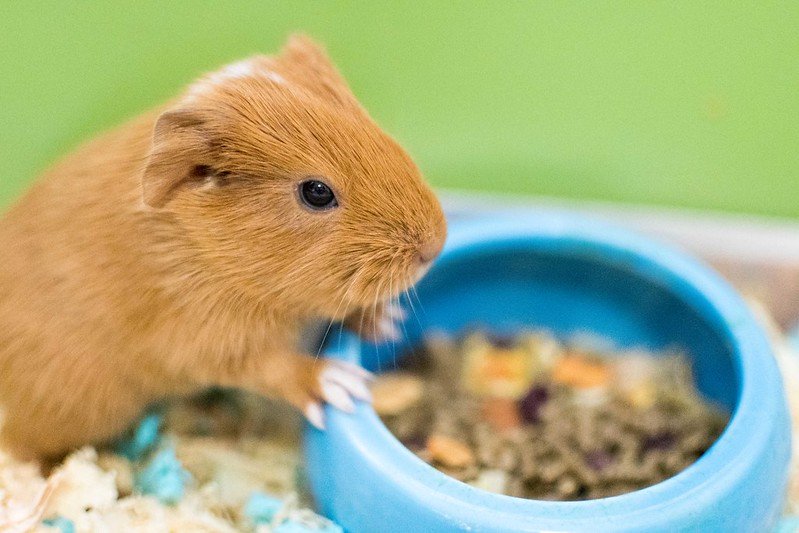
LATEST NEWS
Everything You Need to Know About Guinea Pigs
Guinea pigs are wonderful animals who can make great companions for a variety of families; they’re gentle, tiny and have amazing personalities. Not to mention every single one of them is as cute as a button! Here are key facts about them to help you determine whether you should adopt a guinea pig into your family.
Is a guinea pig the right pet for me?
Will they want to spend time with me?
Absolutely! Guinea pigs get to know their people, get excited to see them and love to spend time with their family.
What about with my children?
Guinea pigs tend to be one of the better pet choices for families with children who are looking for a small companion. Like all small animals, guinea pigs can be fragile and easily startled, so an adult should always supervise and guide children when they are handling them. Keep in mind: although many children love these fuzzy little potatoes with legs, sometimes they lose interest and ultimately it will be the adult’s responsibility to make sure they are loved and cared for.
Guinea pigs are not a low-maintenance animal.
Guinea pigs can poop up to 100 times a day per pig. Their cage will need to be spot cleaned daily to keep it tidy.
Guinea pigs are not always quiet.
Although they are relatively quiet animals, guinea pigs do get very excited over their people and treats and love to let their people know they are there.
When are they awake?
Guinea pigs are awake throughout the day and night. While typically they are not too noisy at night, they may run around a bit. They prefer to take naps in between play and mealtime.
What about allergies?
Although it is possible to be allergic to guinea pigs, people are more commonly allergic to hay or pollen which is a necessary part of their diet.
How are they with other pets?
Guinea pigs do not tend to mind other pets, although they should never be allowed to interact with another species without supervision as there is always a risk involved.
What is their lifespan?
On average, guinea pigs live five to seven years.
Guinea pig needs
A guinea pig friend.
That’s right, guinea pigs for the most part need a friend! Guinea pigs are social animals and live in herds in the wild. To prevent accidental babies, guinea pigs should be kept in same-gender pairs or groups unless they are spayed or neutered.
A wide area to run around.
Guinea pigs love to have space to run around and play. They require unbroken floor space; they are not climbing critters! Females need about 7.5 square feet of unbroken floor space for a pair, while males need about 10 square feet of unbroken floor space per pair.
Lots of food.
Guinea pigs are constantly munching away and it’s important they always have access to food. We recommend they have unlimited access to timothy hay (or orchard grass) and about one cup of vegetables per day. Variety is amazing for their diets, and lots of different colors and types of vegetables are good for them. High-quality pellets are also great for guinea pigs, in moderation. A pig should have about 1/8 cup of pellets per day.
Water source.
Guinea pigs, like all animals, need access to water. While water bottles conveniently hang on the side of their cage and are easy to fill, sometimes the water can get stuck. A water dish gives them a more natural way to drink water (although it can be a bit messy).
Rather than purchasing a guinea pig from a pet store and creating a bigger demand for this small animal, we strongly encourage people to adopt one (or two!) from their local shelter. St. Hubert’s often has guinea pigs available for adoption.
How to Keep Your Pets Safe During Outdoor Air Quality Alert
Just like people, our pets can be affected by unhealthy air quality caused by wildfire smoke. If you feel the effects of smoke, they probably do too. Here’s how to protect your pet from unhealthy air.
High Risk Factors
Certain animals are especially at risk from smoke and should be closely monitored during all periods of poor air quality, including:
Animals with heart or lung disease.
Older pets.
Brachycephalic dog breeds (breeds with short muzzles), such as French bulldogs, Pekingese, pugs, Boston terriers and boxers.
How to Protect Your Pet
Keep pets indoors as much as possible with doors and windows shut.
Bring outdoor pets indoors to a room with good ventilation.
Limit walks to short bathroom breaks and avoid intense outdoor exercise.
Birds should not be allowed outside when smoke is present, as they are especially susceptible.
Have an emergency preparedness kit ready for your pet in case you need to evacuate.
Know the Signs
Consult your veterinarian if your pet experiences any of the following signs of smoke irritation:
Coughing or gagging
Difficulty breathing, including open mouth breathing, increased noise when breathing, or fast breathing
Red, watery, or irritated eyes
Inflammation of the throat or mouth
Nasal discharge
Asthma-like symptoms
Fatigue or weakness
Disorientation and stumbling
Reduced appetite and/or thirst
The increased time spent indoors with limited opportunities for physical and mental stimulation can result in dogs experiencing boredom. To help occupy your pet, engage him or her in activities like playing fetch in a long hallway, using puzzle toys (like this DIY snuffle mat), or teaching your pet a new trick to provide mental stimulation.
Everything You Need to Know About Guinea Pigs
Guinea pigs are wonderful animals who can make great companions for a variety of families; they’re gentle, tiny and have amazing personalities. Not to mention every single one of them is as cute as a button! Here are key facts about them to help you determine whether you should adopt a guinea pig into your family.
Is a guinea pig the right pet for me?
Will they want to spend time with me?
Absolutely! Guinea pigs get to know their people, get excited to see them and love to spend time with their family.
What about with my children?
Guinea pigs tend to be one of the better pet choices for families with children who are looking for a small companion. Like all small animals, guinea pigs can be fragile and easily startled, so an adult should always supervise and guide children when they are handling them. Keep in mind: although many children love these fuzzy little potatoes with legs, sometimes they lose interest and ultimately it will be the adult’s responsibility to make sure they are loved and cared for.
Guinea pigs are not a low-maintenance animal.
Guinea pigs can poop up to 100 times a day per pig. Their cage will need to be spot cleaned daily to keep it tidy.
Guinea pigs are not always quiet.
Although they are relatively quiet animals, guinea pigs do get very excited over their people and treats and love to let their people know they are there.
When are they awake?
Guinea pigs are awake throughout the day and night. While typically they are not too noisy at night, they may run around a bit. They prefer to take naps in between play and mealtime.
What about allergies?
Although it is possible to be allergic to guinea pigs, people are more commonly allergic to hay or pollen which is a necessary part of their diet.
How are they with other pets?
Guinea pigs do not tend to mind other pets, although they should never be allowed to interact with another species without supervision as there is always a risk involved.
What is their lifespan?
On average, guinea pigs live five to seven years.
Guinea pig needs
A guinea pig friend.
That’s right, guinea pigs for the most part need a friend! Guinea pigs are social animals and live in herds in the wild. To prevent accidental babies, guinea pigs should be kept in same-gender pairs or groups unless they are spayed or neutered.
A wide area to run around.
Guinea pigs love to have space to run around and play. They require unbroken floor space; they are not climbing critters! Females need about 7.5 square feet of unbroken floor space for a pair, while males need about 10 square feet of unbroken floor space per pair.
Lots of food.
Guinea pigs are constantly munching away and it’s important they always have access to food. We recommend they have unlimited access to timothy hay (or orchard grass) and about one cup of vegetables per day. Variety is amazing for their diets, and lots of different colors and types of vegetables are good for them. High-quality pellets are also great for guinea pigs, in moderation. A pig should have about 1/8 cup of pellets per day.
Water source.
Guinea pigs, like all animals, need access to water. While water bottles conveniently hang on the side of their cage and are easy to fill, sometimes the water can get stuck. A water dish gives them a more natural way to drink water (although it can be a bit messy).
Rather than purchasing a guinea pig from a pet store and creating a bigger demand for this small animal, we strongly encourage people to adopt one (or two!) from their local shelter. St. Hubert’s often has guinea pigs available for adoption.




